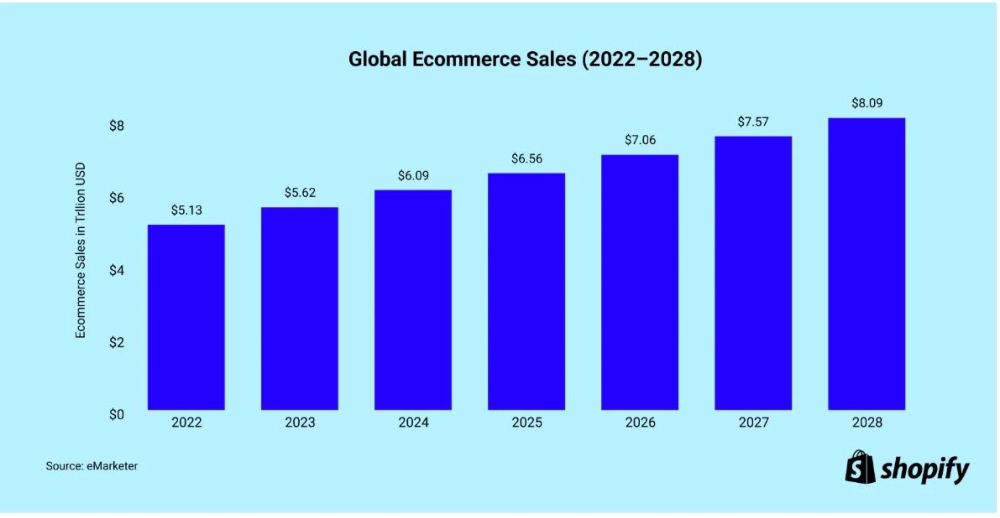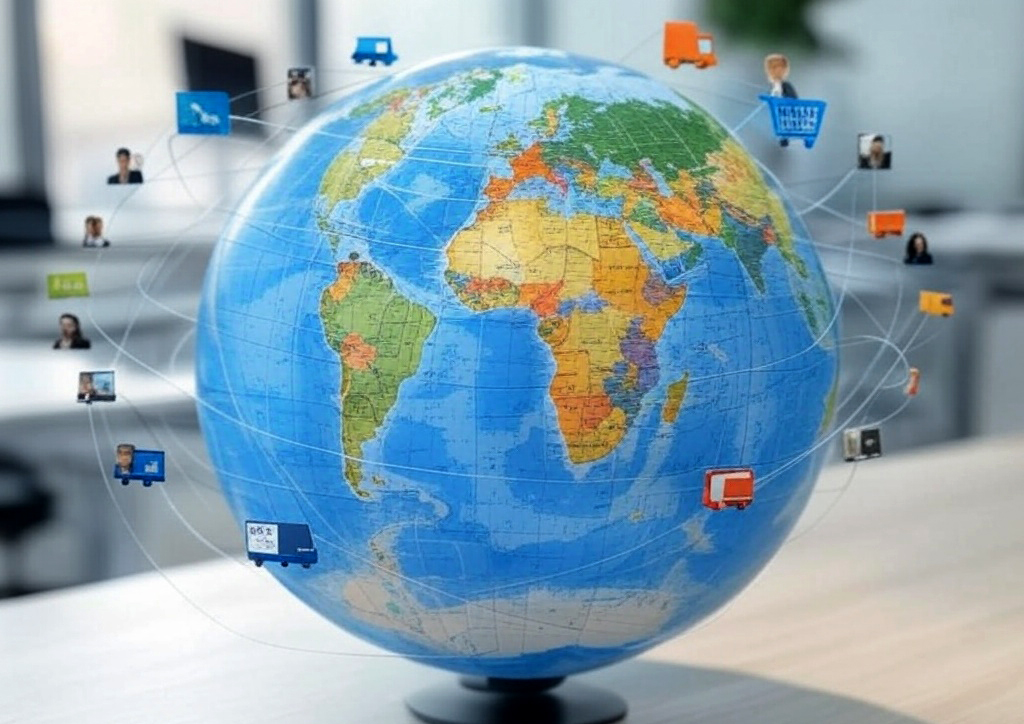Key Takeaways
- Outsourcing offshore allows you to scale efficiently—without burning out or draining your budget.
- Businesses that outsource to countries like the Philippines can save up to 70% on labor costs.
- You can outsource a wide range of roles, from sales and marketing to customer support.
- Choosing a reliable provider is critical. Look for one with a strong track record and industry experience.
Global eCommerce sales are projected to hit $6.56 trillion by 2025. Growth remains steady, and competition keeps getting tougher.

Source: www.shopify.com
Anyone can open an online store, but getting noticed—and staying relevant—is harder than ever. Many sellers struggle not just with attracting buyers but with scaling sustainably.
The real challenge lies in growth: How do you expand without overspending, burning out, or hiring a full in-house team?
That’s where offshore outsourcing is the smart strategy. It helps businesses grow faster while staying lean and profitable.
How eCommerce Is Changing

The industry has evolved dramatically in the last few years.
What used to be simple online selling now involves AI, automation, and fast-moving consumer expectations.
1. AI and Automation Are Reshaping Operations
- Chatbots now handle most routine customer inquiries.
- AI-powered tools generate product descriptions quickly and accurately.
- Automated systems sync content across platforms, reducing repetitive work.
- Smart email follow-ups help recover abandoned carts.
- Restocking alerts are becoming more accurate and timely.
These tools make businesses more efficient, but they also raise the bar. If your competitors are automating and you’re not, you risk falling behind.
2. Customers Expect More Than Ever
Online shoppers have grown used to seamless experiences, low prices, and instant service.
- If your site isn’t mobile-friendly or the checkout takes too long, they’ll leave.
- Ask a customer to wait more than a few minutes for a shipping update, and they’ll likely buy from someone else—often from a store with outsourced 24/7 support.
- Many now expect next-day delivery, thanks to companies like Amazon.
Online, every brand competes on equal ground. Shoppers don’t care if you’re small; they expect the same speed and polish as big retailers.
3. Agility and Cost-Efficiency Are Essential
A great product isn’t enough. You need to act fast, adapt constantly, and operate efficiently.
Rising costs make it difficult to maintain an in-house team, even part-time. Many businesses now stretch their budgets by outsourcing critical roles.
Offshore outsourcing offers a practical way to control costs and maintain high service levels.
Why Outsourcing Drives eCommerce Growth

Running an eCommerce store can feel like juggling a dozen tasks at once. Between customer service, order management, marketing, and product updates, your time disappears fast. That’s why many store owners are turning to offshore outsourcing. It’s a smart way to grow your business, save money, and stay focused on your goals.
Outsourcing offshore means hiring skilled professionals from other countries to handle parts of your business remotely. These workers are often highly qualified and can support your business just like local hires—sometimes even better.
Here’s how outsourcing can drive your growth:
1. It Gives You Back Valuable Time
As your business grows, so does your to-do list. You might be spending hours a day answering customer questions, uploading product photos, or managing returns. These tasks are important, but they pull your focus away from high-level work—like scaling your product line or building better marketing campaigns.
When you outsource tasks such as:
- Processing and tracking orders
- Managing inventory spreadsheets
- Responding to customer messages
- Creating product listings and descriptions
- Posting on social media or sending newsletters
You create more time for the things only you can do—like setting strategy, building partnerships, or researching new markets.
2. It Cuts Costs While Keeping Quality High
Hiring full-time employees in North America, Australia, or Europe often comes with high overhead. You’re not just paying salaries—you’re also covering taxes, office space, equipment, and benefits. It adds up quickly.
Offshore outsourcing allows you to work with talented professionals in countries like the Philippines, India, or South Africa at a much lower cost. For example, hiring a full-time virtual assistant in the U.S. might cost $4,000 per month. In the Philippines, a highly skilled VA might cost $1,400 to $1,600 per month.
Many offshore professionals have college degrees, speak excellent English, and have years of experience in eCommerce support. They can handle the same responsibilities as local hires—and sometimes offer even more specialized skills, like Shopify management, ad support, or analytics tracking.
With the money you save, you can reinvest in areas that move the needle—like Facebook ads, influencer partnerships, or new inventory.
3. It Makes Scaling Smoother and Less Risky
When your online store suddenly takes off—maybe thanks to a viral product or a big holiday sale—your workload can spike overnight. Hiring and training full-time staff fast isn’t always possible. But with outsourcing, you can scale up quickly by adding virtual team members who are ready to go.
During slow periods, like after peak season or in months with lower traffic, you can scale back. Outsourcing contracts are flexible, even allowing you to increase or reduce hours as needed.
This kind of control gives you room to grow without the risk of long-term hiring commitments.
What Roles Should You Outsource?

Running an online business involves juggling many tasks. But doing everything yourself can slow you down. Outsourcing lets you hand off time-consuming work so you can focus on growing your business. These five roles are some of the most useful ones to outsource:
1. Customer Support
Great customer service keeps people coming back. By outsourcing this role, trained professionals handle questions, returns, and complaints. This gives your customers faster, more reliable help while taking pressure off your team. Platforms like kineticstaff.com connect you with agents skilled in email, chat, and phone support.
2. Order Fulfillment
Once a customer buys something, you need to manage shipping, inventory, and updates. This can quickly become overwhelming. A remote team can help track orders, communicate with your warehouse fulfillment partner, and update customers. This reduces mistakes and improves the buying experience.
3. Digital Marketing
Marketing is necessary to grow your audience. You can outsource things like social media, ad campaigns, email marketing, or content writing. A skilled marketing team helps you reach more people, build your brand, and improve results through testing and strategy.
4. Product Listings and Data Entry
For online stores, keeping product listings accurate takes time. Outsourcing this task to a reliable remote worker keeps your site organized and helps drive more sales through well-maintained listings.
5. Bookkeeping and Admin Tasks
Outsourcing bookkeeping, invoicing, and admin tasks to a virtual assistant can save time and reduce errors. With someone else handling the details, you can avoid surprises and stay prepared for tax season.
5 Must-Haves When Choosing an Outsourcing Partner

Outsourcing only works if your provider delivers on what they promise. A bad fit can waste time, money, and energy. Before you commit, make sure your partner checks all five boxes below:
1. A Proven Track Record in eCommerce
You want a team that understands online stores—especially platforms like Shopify, WooCommerce, Magento, or BigCommerce. They should be able to show real experience helping businesses like yours. Ask to see case studies, past results or talk to current clients. This helps you see if they know what they’re doing and if they can meet your specific needs.
2. Clear, Consistent Communication
Before signing, take note of how you’re being treated as a client. You need a provider that answers your messages quickly.
Who is your main point of contact? Do they promptly address your concerns?
3. Commitment to Data Security
A good partner will take data security seriously. Look for providers who follow international rules like GDPR, use strong encryption, and sign NDAs (non-disclosure agreements). Ask them how they protect their own files and accounts.
This isn’t optional—it’s a must.
4. End-to-End Support
Outsourcing should make your life easier, not harder. A good provider doesn’t just send you a list of workers. They should help with hiring, onboarding, training, payroll, time tracking, and performance reviews. That way, you’re not stuck dealing with admin tasks. You can focus on growing your store while they handle the back-end details.
5. Flexible Contracts
You don’t have to start big. A great outsourcing partner will let you start with one or two roles. Once you’re confident in the quality, you can add more team members. If someone’s not the right fit, you should be able to replace them easily. Look for a setup that allows you to scale up—or down—without drama. Your needs may change, and your partner should grow with you.
Trying to run your eCommerce store alone can only take you so far. As your business grows, so do the demands. Offshore outsourcing gives you a way to handle all that without breaking the bank.
You don’t need to hire expensive, full-time staff locally. You just need the right help.
Explore trusted providers like kineticstaff.com to see how offshore support can take your business to the next level.




